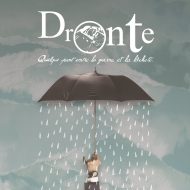 Seven musicians create some sort of fusion. With a double bass and a saxophone in tow, the Beatles, Russian Circles, Napalm Death, Meshuggah and Rimsky-Korsakov are amongst many from many classical and modern pop and metal genres who get mentioned in the same breath as influences. Fusion food can end up like somewhere between nothing and nothing. I was excited at the prospect of sampling Dronte’s uber-experimentalism while conscious that it could all go horribly wrong. “Acoustic post metal” is the mundane but helpful description on the band’s site.
Seven musicians create some sort of fusion. With a double bass and a saxophone in tow, the Beatles, Russian Circles, Napalm Death, Meshuggah and Rimsky-Korsakov are amongst many from many classical and modern pop and metal genres who get mentioned in the same breath as influences. Fusion food can end up like somewhere between nothing and nothing. I was excited at the prospect of sampling Dronte’s uber-experimentalism while conscious that it could all go horribly wrong. “Acoustic post metal” is the mundane but helpful description on the band’s site.
The title of this album translates as “Somewhere between war and cowardice”. This contrast is reflected in the music. I expect I’d have got more out of this if I was French and into the themes, but whilst iconic French bands such as Trust don’t translate, others like Carnival in Coal and Akphaezya do thanks to their off the wall and theatrical presentation. And this is most certainly off the wall.
“Champion en Série” (Successive Champion) sets the scene. The bass guitar provides a measured start, before an explosive roar, backed by a discordant sax, takes us forward. That storm blows over and a little jazzy piece, with expressive French narration, death metal and more discordant sax provide the setting. It cannot be explained. Unfortunately I don’t know what the Frenchman was getting angry about either, which is likely to be a constraint in non Francophone land. Picking out the lyrical subtleties of an angry, ranting Frenchman shouting above a load of controlled cacophony isn’t so easy to pick, even with my reasonable level of French. Luckily the comprehensive sleeve notes are very helpful and I figured out that this is a battle cry …. (translated) “March free and proud!” I’m really not sure of the significance of the line (translated again) “in summary, the addition of my possessions including all taxes but not inclusive of VAT”, but such is the nature of this peculiar beast.
Whether the lyrical theme is clear or not, these are challenging pieces. “Théâtre du Vacarme” (Theatre of Noise) is representative, falling somewhere between vaudeville, political protest, heavy jazz, avant garde formless distorted experimentalism with bizarre and grotesque themes.
“Sarcophage du Succès” (Sarcophogus of Success) starts more calmly and in a sinister fashion. The distorted sax picks up the beat. The narrator tells his tale about a man looking out of his window and hearing the noise of an ambulance. From this the imagery becomes more colourful as the alliterative “fascine, faisceaux, fasciste” (translatable I think as intrigue, lights, fascist or maybe fascination, filters, fascist to preserve the alliteration) and even the executioner come into the vivid tableau. An angry growl intervenes, but at its heart this song has a melancholic feel within its misshapen post rock style acoustic melody. This is the prelude to “Notre Grande Machine” (Our Big Machine) in which our Frenchman rants to a grey and disturbing heavy soundscape.
“Un Orage” (A Storm) starts with a now familiar acoustic pattern, clearly a case of the calm before the orage. A xylophone or maybe a vibraphone provides a refreshing ring. The track develops into post rock style. The saxophone ramps up the tension. It’s a nice track, and we didn’t get the expected storm. The mood doesn’t clear for “Sagesse Gardée” (Guarded Wisdom). To the dreary sound of the saxophone accompaniment, our Frenchman gets more and more excited in his speech – “liberté égalité, prospérité” is the cry. Oh, how French. The growler comes in and the song becomes darker that it already was. The narrator is now hyped up. There’s a lot of this. (Translated) “I am the key”, he finally declares after much agitation. The key to what though?
“Escalade en Chute Libre” (Climbing in Freefall) seems to be a continuation – the grey tones, the distorted saxophone, the animated narration. The acoustic section brings us down to earth, and with that vibraphone exuding magic, the drums get louder and more frantic. It stops and the saxophone plays out a monotonous tune like the end of one of those old artistic European films. Things brighten up a little with “Un Vide Confortable” (A Comfortable Void). The narrator tells his story, increasing his excitement and anger while the backdrop remains grey. “Je réagis, je m’indigne, je suis indigné. Je manifeste” (roughly translating as “I react, I feel indignant, I am unworthy. I protest”. The scene crumbles but hope is restored slightly with a vigorous acoustic ending. Therein lies the comfort, I suppose. And so to “Et puis plus rien” (And Then No More). It is a morbid, minimalist acoustic piece. It also brings this enigma of an album to an end.
“Quelque part entre la guerre et la lâcheté” is a difficult album, made more difficult for most to digest and access by the fact that it’s so French in its concept and of course the use of language. I could write it off by saying it’s for angry Francophones with a love of gloomy avant garde music. Leaving aside the linguistic constraint, it’s hard to immerse in this mélange of styles but musically it is interesting and creative, but patience and an open switch are required to be able to enjoy such experimental structures.
(7/10 Andrew Doherty)

Leave a Reply